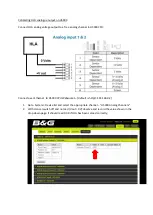
IM CA71-E
6-3
Memory Functions
1
2
3
4
5
6
7
8
9
10
11
12
13
App
6.1 Saving Data into Memory
01 02 03 04 05 06 07 08 09 10 11 12 13 14 15 16
49 50
All these are not yet used.
These are not yet used.
MEM No.07
Indication when selected
ndicates the memory number with which data is already saved.
(Case I)
01 02 03 04 05 06 07 08 09 10 11 12 13 14 15 16
49 50
MEM No.14
Indication of the selection
MEM No.15
MEM No.21
Indication of the selection
Indication of the selection
(Case II)
Example of Key Operation
Working with the MEM SAVE Function
Press the key.
Press the key.
Press the key once again.
Press the key six times.
Press the key.
Data is saved into the area with memory number
14 and the memory mode is cancelled.
Data is saved into the area with memory number
21 and the memory mode is cancelled.
All these are not yet used.
NOTE
• In memory mode, some of the and keys change to those for working
with memory. Consequently, you cannot do the regular task of setting
output values for source.
• The
MEM No.
indicator begins with if no data has been saved into
memory.
If memory contains any saved data already, a memory number immediately
following the largest of the already used memory numbers is allocated to
the next data, as shown in the figure discussed above, even if there is any
not-yet-used memory address at some midpoint.
• In the case of the divided output function (
n/m
), the output value
"setpoint ×
n/m
" for source is stored in memory.
















































